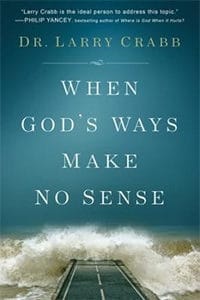Excerpt:
Dr. Larry Crabb: God is not the author of making life terrible, but I would suggest this – that when terrible things do happen, there’s nothing that God cannot use for His purposes.
End of Excerpt
John Fuller: Dr. Larry Crabb is going to help you understand why a loving God allows pain and suffering in your life, and how God can truly be good, even in difficult times. This is Focus on the Family with your host, Focus president Jim Daly. I’m John Fuller and today we’re coming back to a broadcast that was recorded with some friends in the audience at a live event in Charlotte, North Carolina.
Jim Daly: John, one of the biggest questions or struggles that we have as Christians is, why does God allow bad things to happen to good people? I think every Christian has probably wrestled with that. For example, why are people dying from the coronavirus? Or why do good people suffer? Why does God allow financial hardship or job loss? These are the questions we’re asking. If you’ve been around for a while, you no doubt have experienced disappointment. Dr. Larry Crabb will be offering some very helpful, Biblical insight on this critical topic. And one of the things that makes him so effective is that he’s had to struggle with these questions himself. Larry has written a book called When God’s Ways Make No Sense.
John: And of course, we have that available here at Focus on the Family. Dr. Crabb is a psychologist and he’s the founder of NewWay Ministries. And, Jim, here’s how you began that conversation on Focus on the Family.
Jim: This is a deep question.
Larry: It’s a hard question.
Jim: So, where do you get started on this, for that believer who’s had difficulty, who doesn’t know why I made a commitment to Christ, and it’s gone downhill since then? What do you say to that kind of situation and that person?
Larry: You got to ask the question, what good is God in this life? And, um, we all agree, I’m sure every Christian agrees that when the Lord died for us on the cross, that guaranteed us heaven. And that’s a rather good deal, for starters. And then what He’s up to be – between our time of conversion and our time of getting to heaven, when there’ll be no more problems, no more struggles, no more disappointment, no more difficulties of any sort.
Jim: No tears.
Larry: No tears, nothing at all – that’s going to be difficult. But what – what is He up to now? I think that’s a very crucial question because the assumption that’s made by a lot of people, particularly in Western culture, is that what God is up to is giving us the abundant life, defining abundance as an abundance of comfort and abundance of blessings that make life go smoothly, and an abundance of things that make us feel good all the time. And if that’s what He’s up to, He’s not doing a very good job.
Jim: Hmm.
Larry: So, the question has to be, well, what is the abundant life that Jesus promised us, and what is He saying is the good thing that He’s doing for us at every moment? And those kinds of questions have to be thought through very carefully.
Jim: Let’s use an example out of your book. Millie, I think, is the name of the person that you used. I’m sure it’s not the true name. But what was Millie’s situation? And why did that story captivate you?
Larry: She came to me. We had a chance to chat. And she was one of the most cheerful souls that I’ve met. And as we got to know each other, she shared with me some really difficult things. She had a – she had a brother who was dying a slow death. And she was praying that God would take him home quickly because the doctors had given up hope with his ever living for any length of time. And he was suffering so badly. And as she was sharing this story with me, she said, “I prayed that God would take him quickly, and he’s lasted for a long time in terrible pain.” And I found myself saying, “God, why – why are You allowing this to happen? You have the power to change it.” And then she had a son who died instantly, very suddenly with a particular problem that had he been diagnosed it could have been treated. But it had not been diagnosed and then the result was that he, um, went to – went to bed one night and died in the middle of the night. She had a daughter who got so fed up with God that she finally came out of the closet and told her parents that, um, she’s a lesbian. And this woman is saying, “God, are you up to anything good in my life at all?” And then to top it off, if that’s not enough, to top it off, her elderly father – a godly man who as I recall correctly, I think had been a pastor – he committed suicide when he was in his early 80s. And I’m asking this lady, “Millie, tell me why you’re joyful. Tell me why? What’s going on here?” And she said, “I’ve not always been rather joyful. This has been a miserable life for me. But the question that I’ve had to wrestle with more deeply than I’ve ever dreamed I’d have to is: “God, if you really are a good God – and I believe you are – I know the Bible a little bit. I know that if You’ve given us Your Son, how are You going to withhold any good thing from us. But You’ve withheld a lot of good things from me. And I need to understand what You define the word good to be.” And what she came up with, as we chatted together was – and I think this is very, very difficult for me to really grasp as the best news that I’m after – but what God is up to, C.S. Lewis puts it this way, God is up to one major thing in my life and in yours, in every Christian’s life, as Lewis puts it – to produce little “Christs.”
Jim: Hmm.
Larry: To take Christian people and to – and to work with them in such a way that their deepest desire is to love another, to put Jesus on display by how we love. And when she said, “When I got a hold of that as my deepest thirst – I have other desires, like a healthy family and everything going well, but that’s not the first thing in my life. The first thing in my life is to become – to live a little like Jesus because that’s what He’s commanded us to do. And he seems to think, God seems to think that the deepest joy comes from actually putting Christ on display by how we treat other people. And that’s what I have been committing myself to for the last several years. And I’m discovering that there’s some joy in it. But it’s a joy that doesn’t eliminate sorrow. It’s a joy that sustains us in the sorrows of life.”
Jim: Well and let’s get into that because I think that’s perhaps the most difficult aspect of the Christian life, is how do we remain joyful when sorrow strikes us like Millie? I mean, to have all those things happening in a compounding way.
Larry: Yes.
Jim: How – I’m speaking on behalf of that person listening right now who is in the middle of some trauma and they’re shouting at the radio or the podcast saying, “How do you do that?”
Larry: Yeah.
Jim: “I want that. But how do you do that, Dr. Crabb? How do you find that deeper sense of purpose when suffering is all around you?”
Larry: I suspect, based on some experience over the years with my own life as well as many others, that most of us try to make it by living in denial.
Jim: Give me an example so I can grab onto that.
Larry: I don’t – I don’t want to explore what’s really happening in my soul. I don’t want to feel all the pain that I’m feeling. So, I’m going to anesthetize myself in some form and just pretend that God is enough, but only by anesthetizing all my pain. And what I’m suggesting – and I think this is a very, very hard sell. This is not exactly marketable. It explains why my books don’t sell that well, sometimes.
(Laughter)
Larry: That if we’re gonna to meet the God who loves us, He meets us where we are, not where we pretend to be. He meets us where we are, and not where we wish we were. And could we be as honest as the Psalmists? The Psalmists were very, very honest. Paul was very honest. In Corinthians, it talks about I’ve been in despair; I’ve been hurting; I’ve had troubles; but I’ve never been defeated. So, the first thing I would say is don’t pretend that you’re doing better than you are, because when you acknowledge the struggles that are going on in your life, the struggles of faith, and you still turn to God in the middle of your deepest anxiety, your deepest fears, your deepest pain, that is when you start meeting God in a way that sustains you in the middle of all the struggles, and not until.
Jim: Yeah. In fact, we mentioned how this is very personal for you. You’ve kind of talked about the phases of life. How has that become personal for you, what you’ve seen God do in your own life in these phases?
Larry: I was raised in a very strong Christian home for which I’m very, very grateful. And Phase 1: happy Christian kid, everything’s fine. And when I realized that God was my Heavenly Father, I figured I’m in for a really good deal because my earthly father was a really good guy.
Jim: Wow.
Larry: He took care of me, blessed me in lots of ways.
Jim: So, it was the right formula.
Larry: It was the right formula. And everything was gonna work just like I wanted it to. And through, um, earlier days as a kid up to 13 or 14 I was doing just fine. And then teenage struggles hit. I had a very big problem with stuttering. I did my doctoral dissertation on stuttering, because I couldn’t figure out why I couldn’t talk. And I was starting to do a little bit of speaking, even as a middle teenager. And I just lived in the verse that God gave Moses – “I’ll be with your mouth and teach you what to say,” because Moses might have been a stutterer. So, I claimed that verse. And it didn’t work. I made a fool of myself stuttering in front of people. And I thought, “God, why – why do You let me stutter like this? I’m now 15, 16 years old. My life has been going so well. Now I’m full of shame. I’m full of embarrassment. And I don’t know what good You are. And I’m not really sold on this Christian life.” I began Phase 2. I went from being a happy Christian to a questioning, skeptical Christian. And then I decided to go into psychology because Christianity was not giving me the answers that I was looking for my existential questions. Didn’t even know the word back then, but that’s what I was wrestling with. What’s the point of anything? What is really good? What is my life all about? And after five years of training in clinical psych, I came away disillusioned because secular psychology isn’t dealing with the core issues of the soul, things like, what’s really wrong with people? What is the real purpose of life in spite that death is going to meet us all? And, um, existentialism was not dealt with by psychology. So, after I finished my graduate program, I went into Phase 3. And Phase 3 was to give God a second chance. I’m sure He was very grateful.
(Laughter)
Larry: And, um, and I said, you know, “I found no answers in psychology. I found no answers in Christianity as I then understood it.” And I think then I had awakened thanks to Francis Schaeffer. Some people might know that name – a marvelous influence in my life. I really began to realize that if there is a God and He’s spoken to us through his word, the Bible better become very important in my life. And starting at about age 25 or 26, somewheres in there, I began private practice then. For the next 30, 40 years I became immersed in the Scripture. I became immersed in theology. I wanted to know what Christianity – how does it speak to this woman that I’m working with who’s anorexic? How does it speak to the person with same-sex attraction? And – and it became very comfortable. Um, my books began to sell a bit. I got speaking engagements. And I became a little bit known. And I think what happened was – how can I put this without being too inappropriate? I think that my pride was well-nourished.
Jim: This is Phase 3.
Larry: Phase 3, because I was doing quite well. God was coming through nicely for me.
Jim: So, the blessing was coming.
Larry: The blessing was coming. Things were going well. Family life was going well. And then some things started falling apart. And some difficulties came. And God in His grace did not allow me to live only the blessed life. He wanted me to live the transforming life. And those two are sometimes very, very different. And then Phase 4 actually began probably 10 years ago. I’m now 73 years old. So, in my 60s, my question really became, “God, who were You wanting to make me? You want to do more than make me an author that people read. You want to do more than make me a – a speaker that people listen to. You want to make – make me the kind of person, um, that when my wife, as she lives with me, might she actually be drawn to Jesus because of the way I treat her. When my kids want to stay faithful to God because I’ve survived the struggles of life with faith in a good God.” And that’s when I became very interested in a spiritual direction. I kind of gave up psychotherapy and decided to move in a spiritual direction, which to me is just a way of, how do you have a conversation with somebody that interacts with the deepest part of their soul? I don’t want to just put Band-Aids on things. I want to hear what is really going on in your soul. “Millie, what’s really happening in you?” I believe that what – what I’ve been missing for a long time and getting a little bit of a grasp of now – God is telling a larger story than the story that takes place between my birth and my death. He’s telling a story that begins for me at the cross and continues forever at the coming. So, the question for me to ask is not, how is my birth-to-death life going? Am I making enough money to pay my bills? Are – is my marriage good? I’m all for that obviously. Are my kids doing well? Of course, I pray for that. But sometimes the kids aren’t doing good. Sometimes a marriage doesn’t work. What do you do then? And that’s when you say, “What does the cross make possible when life doesn’t work? What does the coming sustain when life is hard?” So, I talk about the larger story. I call it the in-between story – in between the cross and the coming, not in between your birth and your death. Get that perspective and, in my mind, everything changes. And that’s where I’m struggling to live and coming to grips with the fact that’s what I’m called to.
Jim: You know, Larry, when you – when you – there’s so much that you’ve said. And when you try to digest that, and fit it into something like Romans 8:28, that “All things work for good to those who love the Lord and are called by His name.” That can be a tough moment if you’ve lost a child to suicide.
Larry: Of course.
Jim: And cancer – you’ve dealt with cancer yourself.
Larry: I’m currently dealing with cancer.
Jim: And it’s so easy to go there to say, “Lord, why are You not blessing me?” And to hear His whisper, “I am.”
Larry: Yes.
Jim: You just don’t see it.
Larry: I am blessing you. A larger story is unfolding in the worst of moments. And the great challenge for spiritual leaders is to identify the larger story, so that you know what He’s doing in the middle of the worst moments. And that verse that all things work together for good, the question is how does God define good? It may be a little different than how I define good.
Jim: Help us with that. How does He define good?
Larry: Well, one of my favorite phrases from C.S. Lewis – um, I’ve got about 50 favorite phrases from C.S. Lewis, and I…
Jim: Quite a thinker.
Larry: …I think people need to read C.S. Lewis to get to heaven. That’s not true, of course, you understand, but…
(Laughter)
Jim: Now we’re going to get the crit…
Larry: Yeah.
Jim: …mail for that one.
Larry: I don’t believe that, you understand.
(Laughter)
Larry: But I sure think Lewis has been influential in my life. One of the profound things that he said is this – he said, “If you put first things first, second things are thrown in. If you put second things first, you lose both first and second things.” Second things include everything but loving God and loving others because Jesus reduced the law – didn’t reduce the law – He summarized the law: to love God and love others. That’s the point of existence. And everything else, whether it’s good health, whether it’s kids that love the Lord, which I pray for every day, and my kids both love the Lord, and I couldn’t be more grateful, but they’re all second things. And I’ve got to realize that the good that God promises is a good that I might not be able to fully celebrate until heaven. But the good – the first thing is to become fully alive as the man that I am, fully alive is the woman that my wife is. I want to be fully alive, because of the Gospel. And that means fully alive with my potential to love other people in a way that makes a difference in their lives and brings me great joy in the process.
John: This is Focus on the Family and you’re listening to a conversation we had with Dr. Larry Crabb in North Carolina about suffering and the Christian life. And it was based on his excellent book, When God’s Ways Make No Sense. Get that book from us at focusonthefamily.com/broadcast. Here again, is Focus president Jim Daly.
Jim: Larry, let’s speak to the mom and dad with the teenagers. I’m just trying to pick a scenario where there’s a lot of angst. And I think with the mail we see at Focus on the Family, the emails we receive, the counseling department at Focus, this is probably the greatest area of conflict, of need. There’s certainly the marital issues as well. But in that parenting role, they’re counting on the formula. We mentioned it a moment ago, but they’re counting on the fact that if we do A, B and C correctly, Biblically, that we will get the child product, D. And it doesn’t work that way. So, speak to that anxious mom who is now laying her head on the pillow at night going, “Little Johnny, little Mary, they’re not behaving the way I thought they would. There’s a problem.”
Larry: And, Lord, I’m praying to you. Yeah.
Jim: And – and talk that mom through how she needs to have perspective about what the journey is there and what God may be doing in her, and in her child’s life.
Larry: And that’s the – that’s the key. It seems to me that when we go by formulas in any area, but certainly in parenting, if we do this than that will happen, you know. If you go by formulas, and we’re working hard to be the kind of father and mother that we think is gonna change the child, without realizing it, we find ourself in a power struggle. And the child realizes that mom or dad are doing all these things to make me other than I am. And then they feel a pressure that invites resistance. And I’m example A for that. When our kids were – when they were born, our two sons – they’re now 49 and 47, so it takes some memory to recall these things.
Jim: (Laughter)
Larry: But, um, but they, um – when they were born, I determined to be the best father I could possibly be. So, we had family devotions like very few families have devotions. I purchased an overhead projector for family devotions.
Jim: That’s good.
Larry: We…
John: That is…
Jim: That’s…
John: …All in on devotions.
Jim: That’s commitment. Right.
Larry: We did Old Testament survey, New Testament survey.
Jim: Did your kids go, “Ah…”
Larry: Oh, no, they just loved it…
Jim: “…. Dad.”
Larry: Oh, no. They just loved it, of course.
(Laughter)
Jim: Well, it’s better than the felt board.
Larry: Well, it could – if I could have found those, I’d have used it, but…
Jim: One step in the right direction.
Larry: Yeah. My son just told me a couple of weeks ago, we were talking about this, he said, “Dad, did you notice during your lectures with the overhead projector that I was not looking at you. I was looking over your shoulder to watch the Dolphins on television.”
Jim: (Laughter)
Larry: Um, but I think that what was happening in that – I was determined. There was a fist forming in my – in my mind, not just literally in my hand, that was saying, “I’m gonna live this way, and it’s gonna change your life. Are we clear?” And when that’s the mood, it invites resistance. But suppose the mood is agenda-free parenting, longing for a child, praying for the child, of course, to know the Lord and to become successful in life and all the good things that we want for our kids. Nothing’s wrong with wanting that. Nothing’s wrong with praying for it. But am I able to give an example of something that I’m living in such a way that my kids are gonna be drawn to what is alive in me? And that mother, whose burden for little Mary, for little Timmy, whoever it might be, if that woman could come to understand that in all the anxiety and all the struggles of life, is Jesus sufficient to keep her from ever quitting? And is she then able to say, “I would like to put the love that God has for me on display for this child, as opposed to a demanding spirit to get this child to somehow shape up.” And, if her movement toward her son or daughter has that freedom in mind – I’m simply here – and that’s gonna include discipline, it’s gonna include teaching, it’s gonna include all the normal things of parenting, but not with the “and this is gonna work!”
Jim: Right.
Larry: “But more this is gonna please the Lord. That’s all I’m after is pleasing the Lord.” That’s the first thing, while I pray like mad for the second thing, for my kid. Then I think that frees the child up. And I could tell you stories about my two sons where I think when I got over my agenda-determined relating, particularly, that’s my older son, that’s when he, I think, came to Christ in a very deep way.
John: Larry, I so appreciate that perspective. Um, it – that kind of thing came up this past weekend where there was a conversation among some men about God’s intentions for us. And you’ve – you’ve touched on it – what’s the heart of God, and how do I respond to that. And there was an exchange between an older more gracious man and a younger man, who had the head knowledge, that um, that God sends things our way to make us a certain way, kind of the parenting illustration you just made. That’s not what happens with these difficulties in life. My kid doesn’t go off the rails. Cancer doesn’t happen. Car crashes don’t occur because God’s sending the pain so that He can make us into something, right?
Larry: Yeah.
John: And so, I guess the bottom line is why does He send, or why does He allow these things? Or do they just happen?
Larry: And that’s a big distinction: send or allow? If we had a couple hours and I could confuse everybody, I’d talk about my views on sovereignty.
John: Hmm.
Larry: But what I would say is this – that we live in a fallen world, bad things do happen. God is not the author of sin. God is not the author of making life terrible, but I would suggest this – that when terrible things do happen, there’s nothing that God cannot – nothing is going to happen that God cannot use for His purposes. And until I believe that – when our younger son – I say this with permission – when his first wife left him and broke his heart – a terrible tragedy in our family – it was a very, very painful – I remember sitting with my son. And he was – he was crying. He was weeping, and I was weeping with him. And I said, “Ken, I gotta assure you of something.” I said, “Nothing is ever gonna happen in my life or in yours that God cannot use for a purpose that one day you will celebrate. Maybe not right now, but one day, God is doing – is working something good inside of you to make you the person that you most long to be.” And that strikes me as a very, very important perspective that I have to cling to in the middle of health struggles and other struggles that continue in everybody’s life.
Jim: Larry, could I ask you to pray for the folks who are struggling? They’re trying to figure out, “God, what are you doing in my life?” They’re in their Job moment. And I know what God’s pursuing for them is the right attitude, the right orientation to Him. Can we pray for those people?
Larry: Absolutely. Heavenly Father, I prayer for any soul that’s struggling with all the difficulties of life that, by Your spirit, You’ll make them aware that You really are a good Father and that You have a good plan and that even in the darkest moment, Your love has not abated, Your love has not gone on – gone off-duty, that Your loving is – Your loving purposes are being accomplished in anybody’s life who is surrendered to You. Heavenly Father, we’re grateful for that. And may people who are struggling so deeply now learn what it means to be grateful for Your – for Your everlasting love. Lord Jesus, You took care of our worst problem, and I pray that You’ll teach each of us to hate our sin more than we hate our pain, knowing that You’ve paid the price of our sins, so that eventually we’re gonna to be released from all pain in an eternity that’s gonna make it worth it all – whatever we go through here. Teach us the value of the cross. And Holy Spirit, You dwell within us. And I pray that You’ll prompt that person who, right now, is just wondering, “What on earth is going on?” That You’ll prompt them to realize that their deepest thirst is to know You in the middle of whatever’s going on, and that that is not simply a possibility, it’s a guarantee. You’re available to be known by any who’s willing to be authentic about their struggles and to come to You without resisting You, without distorting You, but trembling in the middle of what’s hard, but trusting that You’re a loving God and Your purposes will be accomplished. You’ve begun a good work. You’re gonna complete it. And eternity is going to be a source of incredible joy that will never ever – never end. And I ask it in the name of the only One that gives us access to You, Father, in the name of Christ. Amen.
Jim: Amen. Thank you, Larry.
Larry: My privilege.
John: What an important Focus on the Family broadcast. And I do hope that Dr. Larry Crabb’s prayer has touched you. And whatever your need is today and of course, every day, we have the opportunity to trust God with our lives and our circumstances. And what an encouraging conversation with him, Jim.
Jim: It was, John, and what a wonderful time we had with Dr. Crabb in Charlotte, North Carolina. I so appreciate his deep insights into some really tough topics like suffering. Here’s a man who has served God for most of his life – counseling, speaking, helping people in their marriages, and writing books to help us in our faith – and yet, he has had his own struggles and he’s very vulnerable with that. Larry’s dealt with cancer and the tragic loss of his brother in a plane crash, and he’s clung to God and to truth even when he didn’t fully understand what God was doing in his life. And there are times in our own lives where we’re gonna walk through that valley – we’re not gonna understand. And Larry has articulated those things so well. When God seems silent, we can rest assured that He has not forgotten us. He’s right there with you. He loves you and He truly wants the best for you.
John: And Dr. Crabb’s book will reinforce that truth. It’s called When God’s Way Makes No Sense. You can tell by the conversation that it’s rich in really powerful content to help you grow and to make it through difficult times. Get a copy from Focus on the Family when you get in touch.
Jim: And as we often do, John, we want to get this resource into your hands, and if you can send a gift of any amount, we will do that as our way of saying thank you. And let me add, if you can’t afford it, that’s okay. Others, I hope, will underwrite the cost of that, and we will give you this resource even if you can’t afford it. Just call us because you, I’m assuming, will need it in your valley moment.
John: Yeah. We want to encourage you to donate today when you call 800-A-FAMILY. 800-232-6459. Or stop by focusonthefamily.com/broadcast. On behalf of Jim Daly and the entire team here at Focus on the Family, thanks for listening. I’m John Fuller inviting you back next time. We’ll hear more from Dr. Crabb about how you and I can learn through suffering as we once again help you and your family thrive in Christ.




















